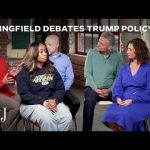In the world of politics and trade, a spirited debate is unfolding over the use of tariffs, thanks in part to the noteworthy efforts of individuals like Todd Nettleton from The Voice of the Martyrs. For more than twenty years, Todd has dedicated himself to raising awareness about the persecution of Christians worldwide, and his newly released book, *Faith is Forbidden*, adds a powerful voice to his life’s work. Meanwhile, the conversation on tariffs continues to gain momentum, highlighting America’s complex relationship with trade partners, particularly China.
Recently, a discussion erupted on a conservative talk show, where a curious listener questioned the effectiveness of President Trump’s proposed tariffs. The listener pondered if it would be wiser to gradually build up domestic production rather than imposing heavy tariffs all at once. This is a valid concern that many people share, especially as they think about the cost implications for everyday goods. The significance of this debate is enormous, as it directly impacts consumers and the economy as a whole.
The host of the show responded by emphasizing the critical need for the United States to reduce its reliance on China. With imports ranging from semiconductors to essential vitamins, the risks of dependency have been laid bare. Imagine needing vitamin C for your health, only to find out that it is predominantly produced in China! The host argued that while trade deficits aren’t inherently bad, the vulnerability created by relying on a single trading partner can be disastrous.
In a positive twist, the outlook on American manufacturing is starting to shift, with Toyota, Hyundai, and Nvidia making significant investments in the U.S. Such developments signal a potential renaissance for industrial jobs in America, and tariffs may be a key tool in making this happen. The conversation pointed out how tariffs could be used strategically, as a “forcing function” to get countries like Vietnam and Japan to come to the negotiating table.
However, the listener’s desire for a more gradual approach raises valid questions. The host acknowledged that the tariffs have been paused and shuffled around like a game of musical chairs, creating uncertainty for businesses. Still, he argued that the focus should primarily be on China, where the dependencies are most pronounced. The fear of potentially being cut off from essential goods makes the use of tariffs a necessary measure to safeguard national interests. This ongoing drama in trade policy is captivating, especially as it has such wide-ranging effects on American families and businesses.
As Todd Nettleton continues to shine a light on an important international struggle, it serves as a reminder that in the political arena, there’s often a bigger picture to consider. While tariffs can be a tool for change in manufacturing, it’s essential to balance that approach with the needs of industries and the public. Whether looking at trade or global religious freedoms, the conversations are complex, nuanced, and crucial for the future. For now, Americans are not just waiting for answers; they are watching closely as the political landscape unfolds.




